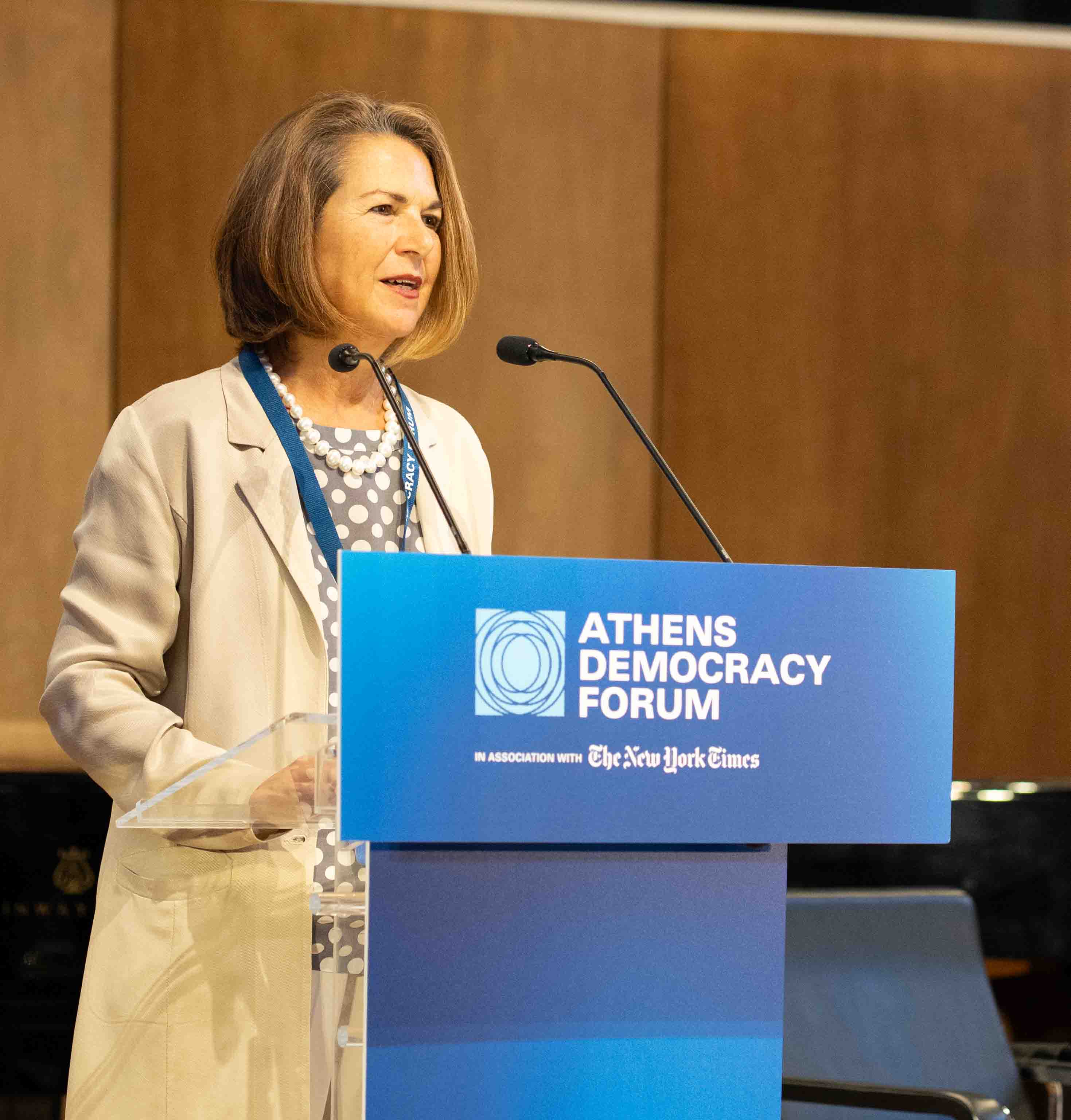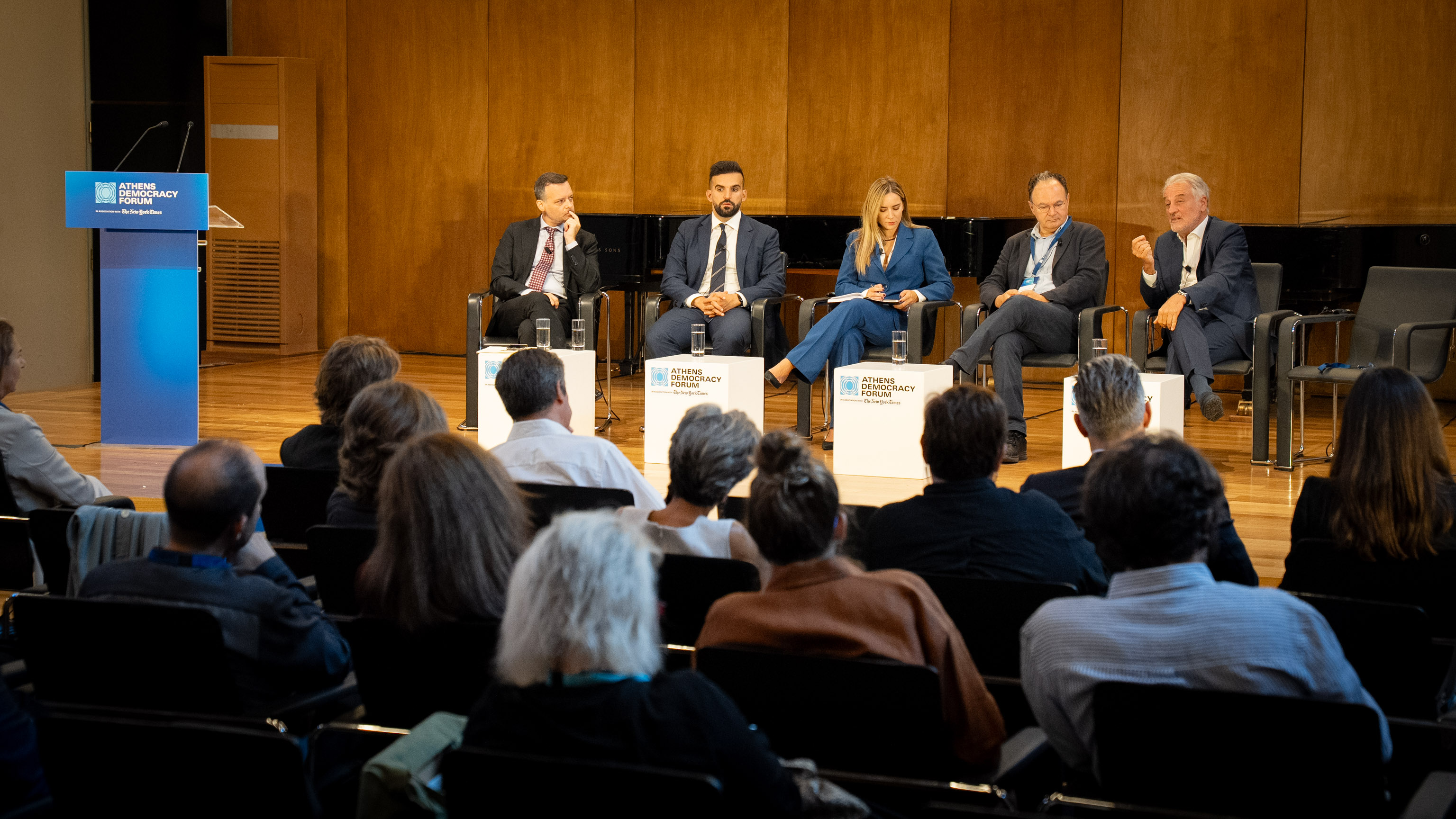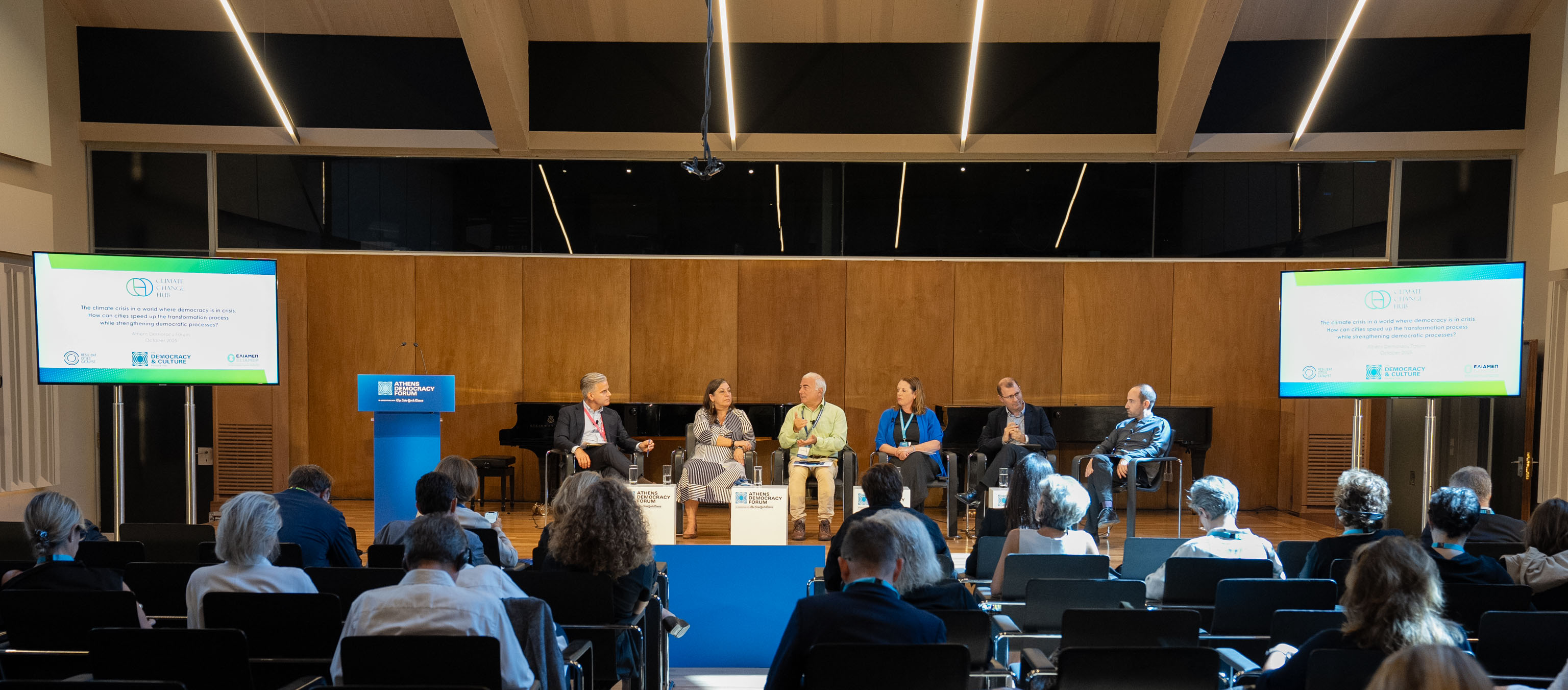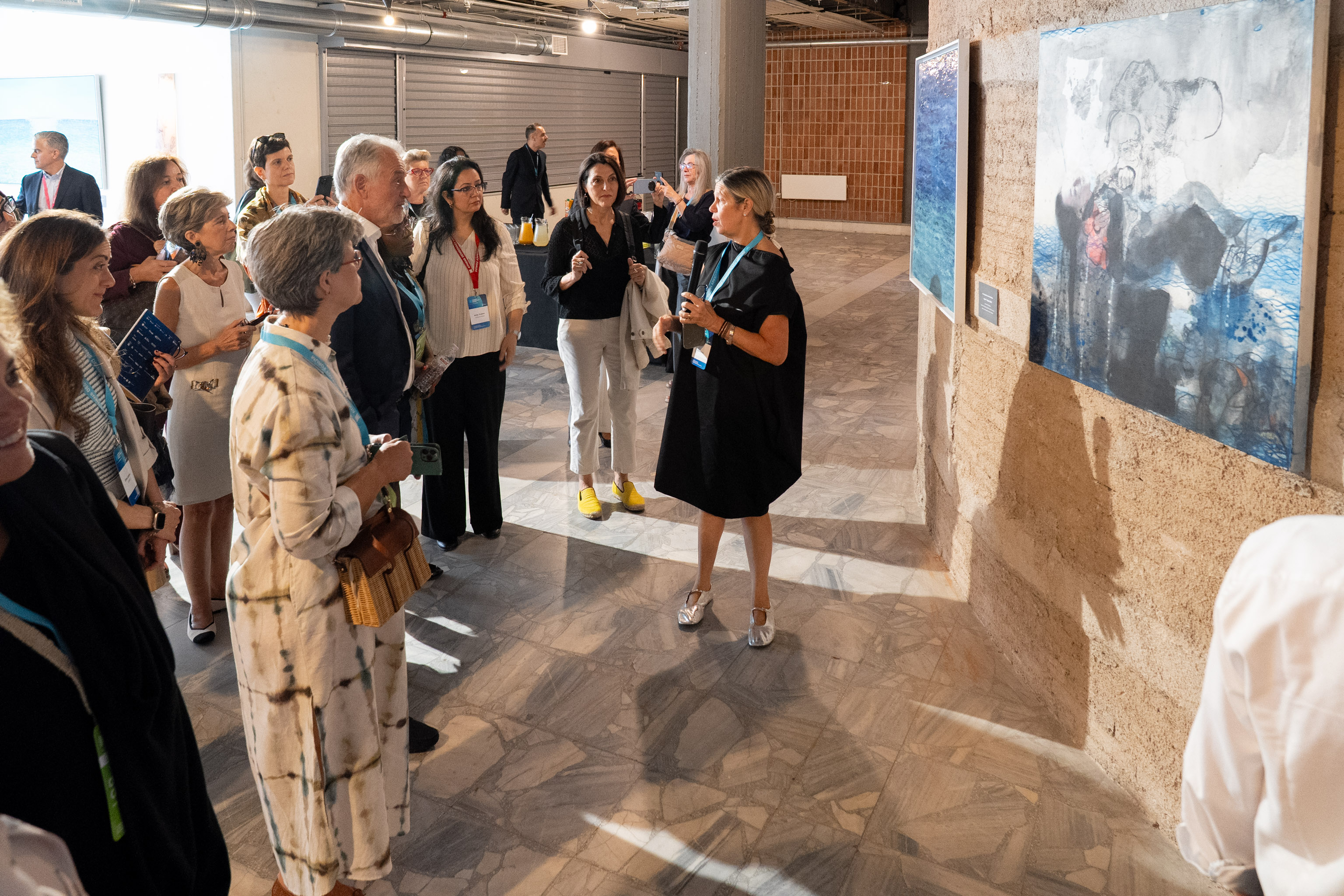Climate Change Hub Module at Athens Democracy Forum 2025 - October 1st 2025
On October 1, 2025, the Climate Change Hub organised a Module as part of the Athens Democracy Forum, entitled “ The climate crisis in a world where democracy is in crisis. How can cities speed up the transformation process while strengthening democratic processes? ”. The event took place at the Athens Conservatoire and featured two panel discussions, along with the artistic exhibition titled “TOPOS in Need.”

The event was opened by Ms Maria Logotheti, President of the Climate Change Hub, followed by Mr. Achilles Tsaltas , President of the Athens Democracy Forum . Maria Logotheti, highlighted in her opening remarks the link between growing public distrust in the political system, the crisis of democracy and diminished effectiveness of climate transition measures. She also emphasised the crucial role of evidence-based policymaking and the contribution of the Climate Change Hub in this area.
The discussions highlighted the unjust distribution of the burden of climate transition across society and the inability of municipalities to adequately respond to citizens’ needs due to a lack of sufficient resources and authority. However, it was also noted that when policies address people’s everyday lives citizens become more engaged and willing to participate. Cities have a moral responsibility to lead by example in the climate transition. ‘True’ Resilience requires not only institutional changes but also the active participation of citizens as a driving force in the transition.

The first panel, titled “The Climate Crisis in a World Where Democracy Is in Crisis,” was moderated by Iliana Magra , journalist at Kathimerini . Haris Doukas , Mayor of Athens, emphasised that: “The climate crisis and the crisis of democracy are deeply interconnected. It is clear that climate change represents a social, economic, and moral crisis that disproportionately affects the most vulnerable. At the same time, the crisis of democracy is manifested in the erosion of institutions and the rise of extreme voices. Therefore, the response to the climate crisis cannot be only technocratic, and the response to the democratic crisis must lie in strengthening local communities and ensuring accountability.” Following that, Mete Coban , Deputy Mayor for Environment and Energy at the Greater London Authority, addressed the scale of local financing required. He stated: “Cities are not adequately equipped—financially or institutionally—to meet the full scope of climate adaptation and decarbonization. Without innovative approaches to green financing and stronger collaboration frameworks, climate ambitions risk remaining purely conceptual. George Papaconstantinou , Professor of International Political Economy at the School of Transnational Governance of the European University Institute (and former Minister of Finance and Environment), added: “If we ignore the human cost of the transition, social backlash may undo what we’ve achieved. The goal is not to idealise parliamentary systems, but to maintain public engagement, foster public dialogue, and put pressure on politicians—demonstrating that citizens are informed, active, and demand change.” Finally, Loukas Tsoukalis , Professor at the Paris School of International Affairs (Sciences Po) and President of the Hellenic Foundation for European and Foreign Policy (ELIAMEP), remarked: “Democracies always struggle when asked to reconcile long-term benefits with short-term costs. Climate change is a prime example. At least, we should not ask the poor to pay the bills.”

The second panel, titled “How Can Cities Accelerate Transformation While Safeguarding Democratic Principles?” was moderated by Paul Nelson , Founding Principal and Executive Director of Resilient Cities Catalyst . The discussion opened by Haris Biskos framing the central role of municipalities as catalysts within the urban ecosystem—capable of mobilizing active civil society, the market, research institutions, and political leadership at both national and regional levels. In closing, he stressed: “The greatest innovation in tackling climate change is not related to technological aspects, but rather lies in better climate governance—governance that is inclusive, transparent, and based in genuine partnerships.” The first to speak was Maria Vassilakou , CEO of Vassilakou Urban Consulting, former Deputy Mayor of Vienna, and member of the EU Mission Board for 100 Climate-Neutral Cities by 2030. She emphasized: “The transition of cities toward a sustainable and functional future requires structured local action, active citizen participation and empowerment, and the support of a strong national policy framework.” Nikos Chrysogelos , Deputy Mayor for Climate Governance and Social Economy, noted: “We urgently need to move from small-scale, fragmented climate projects towards large-scale, integrated urban transformation. A climate strategy should not be limited to environmental concerns—it must be a tool for addressing social issues and enabling holistic city transformation with active citizen participation.” Stelios Diakoulakis , Deputy Regional Director for Europe at C40 Cities and member of the Climate Change Hub’s Strategic Council, added: “"By prioritizing their internal transformation, improving climate governance systems, and establishing mechanisms for closer collaboration and mutual support with key local stakeholders, cities and municipal authorities can enhance their effectiveness—while also upholding the democratic principles of participation and transparency.” Marnie McGregor highlighted the critical importance of citizen empowerment—particularly among youth—for effective climate action and democratic resilience. She stressed that: “Cities are uniquely positioned to bridge the growing gap between ambition and action. They have already made significant progress in addressing and adapting to climate change. Now, it is time for national governments to fully unlock the potential of cities in building a resilient, low-carbon future.”
The event was attended by representatives from the Municipality of Athens, political parties, the Bank of Greece, the Representation of the European Commission in Athens, and institutions such as EYDAP, PPC (DEI), ELIAMEP, ICLEI, and Greenpeace, as well as members of the Leadership Council of the Climate Change Hub."

The CCHub module was framed by the Artistic exhibition titled «TOPOS in need» curated by Iris Kritikou, Archaeologist, Art Historian, curator, with the participation of distinguished Greek visual artists, as well as the Museum of Greek Children. The exhibition took place at the Ω 2 auditorium giving participants of the CCHub event, as well as delegates of the Athens Democracy Forum, the opportunity to explore the issue of climate change from a different perspective—that of art.
Iris Kritikou, curator of the exhibition “TOPOS in need” states: “Understanding the place as a dense reservoir of geographical particularities often of unique beauty, human existence in interdependence, recognizable cognitive patterns, the circulation of ideas and cultural patterns linked to thoughts and feelings, actions and recognizable structures of achievement, we simultaneously realize its fragility. The fragility of an inhabited “garden” of geophysical and human beauty, which, being attacked from everywhere, despite its uniqueness, despite its inability to reproduce, calls for help.”
This exhibition marked the beginning of a new collaboration between the Climate Change Hub and the “TOPOS in need” platform, aiming to highlight the role of art as a means of representing, interpreting, and confronting the challenges of the climate crisis.
The arists and their art works presented at the exhibition:
Io Angeli, Beyond the limits (2019)
The work refers to the deforestation of the mountains, water pollution, precariousness of habitation.
Ioanna Angelidou, Roots and Branches (2025)
Ioanna Angelidou, Past, Present and Future (2025)
Anna Achilleos, Aegean (2025)
Nikos Vatopoulos, Urban memory stone relic
Vassilis Vrettos, Coffins (2018)
The catastrophic fire of July 23, 2018 in Mati, Attiki left over 104 people dead.
Many died in their cars while trying to escape. - Photo Exhibit “23/07/18” at the Benaki Museum
Maria Giannakaki, Untitled (2015)
Theofanis Goulis, Rubens dystopia (2024) & Da Vinci dystopia (2024)
Christina Douzeni, Tree with two goats (2025)
Andreas Theodorou, Untitled (2025)
Katerina Kalitsounaki, Four seasons (2025)
Evita Kanellou, Urban Relics (2025) & Structures in Dissonance (2025)
Spyros Koikas, The Meal (2025)
Nick Kranakis, Thorns (2025)
Nikos Leontopoulos, Street voice (2023) & Time expired (2023)
Pandora Mouriki, Eleonas (2023)
Manos Mpatzolis, The Platanus| (2024)
Panayiotis Beldekos, Votanikos (2024)
Christos Papadakis: TOPOS I: Lumpy olive tree (2015) & TOPOS 2: Bending tree (2015)
Marietta Papacheimona, If only... (2025)
Lila Papoula, Inner light (2025)
Christina Paraskevopoulou, Interconnected topographies (2025)
Vivi Perysinaki, In Between, 2023
Vaggelis Polizos, Flowers and fruits of the earth, 2015-2025
Vaggelis Poulis, Family of Syrian Refugees/Port of Piraeus (2016), Metrosolitude (2022) & Dollhouse Athens (2022) (Photography)
George Rorris, Tin roofs (1995)
Pavlos Samios, Omen of threat (1992)
Chrysa Skordaki, Unforgiven oblivion (2019)
Ioanna Terlidou, Far away from home (2023)
Smaro Tzenanidou, Awaiting water (2024)
Smaro Tzenanidou, For those who watch us (2024)
Vasso Triga, Lifegiving water-OASIS (2022)
Maria Filopoulou, To the light (2024)
Yiannis Psychopedis, Palermo. People and ruins (2024)